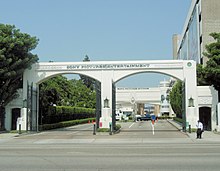The Interview
The Interview is a 2014 American political satire[7] action comedy film produced and directed by Seth Rogen and Evan Goldberg in their second directorial work, following This Is the End (2013).
The film stars Rogen and James Franco as journalists who set up an interview with North Korean leader Kim Jong Un, played by Randall Park, only to then be recruited by the CIA to assassinate him.
In November that year, Sony's computer systems were hacked by the "Guardians of Peace", a cybercrime group allegedly connected to the North Korean government[8] that also threatened terrorist attacks against theaters showing the film.
Traveling to the outskirts of Dandong, China to receive instructions from North Korean chief propagandist Sook-yin Park, Rapaport accepts the interview on behalf of Skylark.
Following Rapaport's return, CIA agent Lacey visits the duo and requests that they assassinate Kim with a transdermal strip of ricin via handshake to prevent a possible nuclear launch against the West Coast; they reluctantly agree.
Upon arrival in Pyongyang, the group is greeted by Sook and taken to the palace where they are introduced to Kim's personal security officers Koh and Yu, who are immediately suspicious of them.
Skylark returns and tries to get Sook's support to assassinate Kim, but she disagrees, suggesting to instead damage his cult of personality and show the North Korean people the dire state of the country.
During the internationally televised interview with Kim, Skylark addresses increasingly sensitive topics, including the food shortage and US-imposed economic sanctions, then challenges his need for his father's approval.
Skylark, whose bulletproof vest has saved him, regroups with Rapaport and Sook to escape and hijacks Kim's tank to get to their pickup point, killing several more soldiers in the process.
The film also features cameo appearances from Eminem, Rob Lowe, Bill Maher, Seth Meyers, Joseph Gordon-Levitt, Song Kang-ho, Brian Williams and Scott Pelley.
Iggy Azalea, Nicki Minaj, Emma Stone, Zac Efron and Guy Fieri appear in the title card for Skylark Tonight.
[9] Seth Rogen and Evan Goldberg developed the idea for The Interview in the late 2000s, joking about what would happen if a journalist was required to assassinate a world leader.
To write the story, Rogen, Goldberg and Sterling researched meticulously by reading non-fiction books and watching video footage of North Korea.
[10] They were pleased when former NBA star Dennis Rodman visited North Korea and met Kim, as it reinforced their belief that the premise of the film was realistic.
"[11] In August 2014, Sony delayed the film's release from October 10 to December 25, 2014,[28] and made post-production alterations to the film in order to modify its portrayal of North Korea, including modifying the designs of buttons worn by characters (which were originally modeled after real North Korean military buttons praising the country's leaders) and cutting a portion of Kim Jong Un's death scene.
[29]In December 2014, South Korean singer Yoon Mi-rae revealed that the film used her song "Pay Day" without permission, and that she was taking legal action.
[32] The hackers leaked internal emails, employee records and several recent and unreleased Sony Pictures films, including Annie, Mr. Turner, Still Alice and To Write Love on Her Arms.
The other, posted to Pastebin, a web application used for text storage which the Guardians of Peace had used for previous messages, stated that Sony had "suffered enough" and could release The Interview, but only if Kim Jong Un's death scene was not "too happy".
Those who attacked us stole our intellectual property, private emails, and sensitive and proprietary material, and sought to destroy our spirit and our morale – all apparently to thwart the release of a movie they did not like.
[58][59][60] Guardian film critic Peter Bradshaw wrote that it was an "unprecedented defeat on American turf", but that "North Korea will find that their bullying edict will haunt them.
"[61] In the Capital and Gizmodo suggested the cancellation caused a Streisand effect, whereby the attempt to remove or censor a work has the unintended consequence of publicizing it more widely.
[70][71] Sony released The Interview for rental or purchase in the United States through the streaming services Google Play, Xbox Video, and YouTube on December 24, 2014.
[75] On December 27, the North Korean National Defence Commission released a statement accusing President Obama of forcing Sony to distribute the film.
[77] In the first week of January 2015, Sony announced The Interview would receive a wide theatrical release in the United Kingdom and Ireland on February 6, but it would not be distributed digitally in the UK.
The site's consensus reads: "Unfortunately overshadowed by controversy (and under-screened as a result), The Interview's screenplay offers middling laughs bolstered by its two likable leads.
[91] IGN's Roth Cornet wrote that "though it's unlikely to stand out as one of the shrewdest political satires of its time, [it] is a clever, unrestrained and—most importantly—sidesplitting parody that pokes fun at both a vapid media and one of the world's most dangerous dictators.
"[93] Jordan Hoffman of The Guardian gave the film three out of five stars and wrote that "if this unessential but agreeable movie really triggered an international response, this is life reflecting art in a major way.
"[94] Scott Foundas of Variety panned the film for being "cinematic waterboarding" and "about as funny as a communist food shortage, and just as protracted", but praised the performances of Randall Park and Diana Bang.
[18] Mike Hale of The New York Times also praised Park and Bang, but wrote that "after seeing The Interview and the ruckus its mere existence has caused, the only sensible reaction is amazement at the huge disconnect between the innocuousness of the film and the viciousness of the response.
[98] Bennett contacted the Special Envoy for North Korean Human Rights Issues, a personal friend of his, who "took the standard government approach: we don't tell industry what to do".
